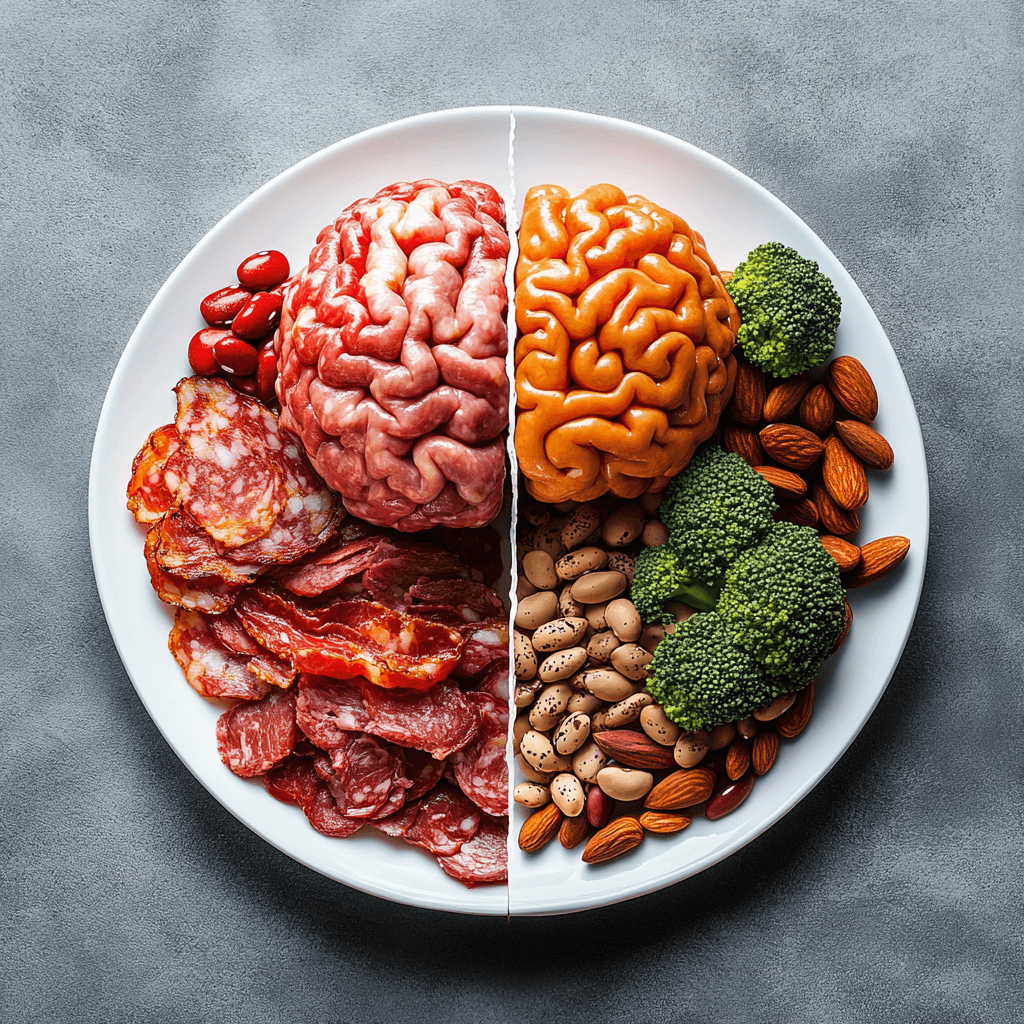
It’s a hot topic, and science has struggled to find a definitive answer. Does red meat harm the brain and increase the risk of dementia, or doesn’t it?
Since the findings of past studies were mixed, Harvard researchers were determined to gain more clarity, so they analyzed data from over a hundred thousand health professionals over four decades.
The result? You can eat certain red meats, but not others, if you want to protect your brain.
Key Takeaways
- Processed red meat is linked to a 15% higher risk of dementia and cognitive decline.
- Replacing processed red meat with nuts and legumes lowers dementia risk by up to 23%.
- Processed meat accelerates cognitive aging, while unprocessed red meat shows no significant harm.
Meat is Unfairly Demonized
“Meat often gets demonized,” says Kristina Petersen, associate professor of nutritional sciences at Pennsylvania State University.
But this is unfair, she says, because this negative attitude to meat usually comes from population studies in which the overall diet quality leaves much to be desired. In other words, is the burger the problem, or the fries that go with it?
Any risk from eating meat is doubtful to come from the meat itself but from added estrogenic hormones, pesticides, and other additives, so eating organic is far preferable. Many experts agree that meat is fine but think overindulging could be harmful, so it should be limited to no more than 21 ounces a week.
Not so when it comes to processed meat.
Even small amounts were shown to reduce brain function and increase memory loss. These products can be extremely high in sodium and contain many additives and preservatives.
Despite study findings, definitive evidence of cognitive harm is hard to come by. Hence, Harvard researchers conducted a study and reported their findings at the recent Alzheimer’s Association conference in Toronto, Canada.
Processed Meat Boosts Dementia Risk
The study included over 130,000 health professionals tracked for up to 43 years.
Of these, 87,424 participants free from dementia, stroke, cancer, or Parkinson’s disease, when the study began, filled out food frequency questionnaires every two to four years. The researchers focused on collecting data on consumption of red meat and processed red meat (e.g. bacon, sausages, salami) and nuts and legumes (e.g. beans, peas, lentils, peanut butter).
A subset of 17,458 participants had their cognitive function tested via a telephone interview using the Telephone Interview for Cognitive Status tool, and they collected information on subjective cognitive decline in another 43,964. Over the whole period, the researchers identified 11,173 cases of dementia.
The findings were as follows:
- Processed meat increased dementia risk: Processed red meat intake of two or more servings a week was linked to a 15% higher likelihood of dementia and a 14% higher likelihood of subjective cognitive decline compared to those with an intake of less than three servings a month. (Two slices of bacon count as one serving, as does one hot dog and two ounces, or two small links of sausage).
- Processed meat consumption’s link to risk related to level of intake. Higher processed red meat intake accelerated aging in global cognition by 1.61 years and verbal memory by 1.69 years for every additional serving per day.
- Replacing meat with healthier foods reduced dementia risk. Replacing one serving a day of processed red meat with one serving of nuts and legumes lowered the risk of dementia by 23%, subjective cognitive decline by 20%, and reduced cognitive aging by 1.37 years.
- Unprocessed meat was not linked to dementia. Unprocessed red meat intake of one or more servings/day compared to less than half a serving/day was associated with a 16% higher likelihood of subjective cognitive decline, but this wasn’t statistically significant.
Nitrites and Sodium Harm The Brain
The study was led by Yuhan Li, who commented: “By studying people over a long period of time, we found that eating processed red meat could be a significant risk factor for dementia. Dietary guidelines could include recommendations limiting it to promote brain health.
“Processed red meat has also been shown to raise the risk of cancer, heart disease, and diabetes. It may affect the brain because it has high levels of harmful substances such as nitrites (preservatives) and sodium.”
This study was presented at a medical conference, so we only have the media release and abstract. Until it’s peer-reviewed and published, we won’t know whether intake of fruits, vegetables, and grains was included in the analysis, as well as multiple other factors that could have influenced the findings. It’s also not clear how subjective cognitive decline was assessed.
Even with these caveats, this study follows others showing that processed red meat products are not healthy for the brain or the body. They are best kept to a minimum or avoided altogether.
Summary
A Harvard study suggests that while unprocessed red meat may not significantly harm cognitive function, processed red meat like bacon and salami is linked to an increased risk of dementia and cognitive decline. High intake of processed meat accelerates brain function aging, whereas replacing processed meat with nuts or legumes can lower dementia risk. The findings highlight the importance of reducing processed red meat consumption and choosing healthier alternatives to protect brain health.
Frequently Asked Questions
- Does eating processed red meat increase dementia risk?
Yes, consuming two or more servings of processed red meat per week is linked to a 15% higher risk of dementia and cognitive decline. - Is unprocessed red meat harmful for cognitive function?
While unprocessed red meat, like steaks or hamburgers, showed no significant increase in cognitive decline risk, moderation is still recommended for overall health. - What foods can help reduce the risk of dementia?
Replacing processed red meat with nuts, legumes, and other plant-based foods can reduce dementia risk by up to 23%. - How does processed meat affect the brain?
Processed meat contains harmful substances like nitrites and high levels of sodium, which can negatively impact cognitive function and accelerate brain aging. - How much processed meat is too much for brain health?
Even small amounts of processed red meat, such as two slices of bacon or one hot dog per week, can increase the risk of cognitive decline.
